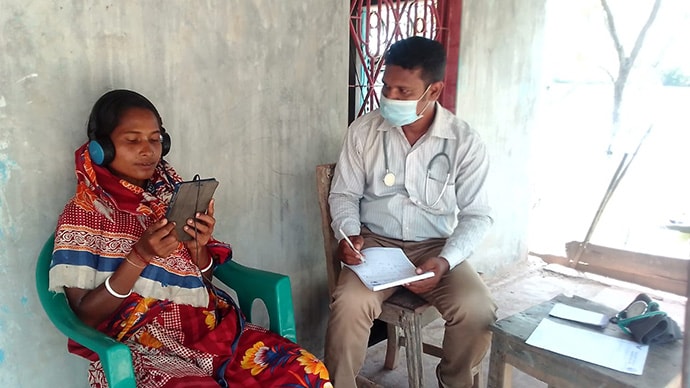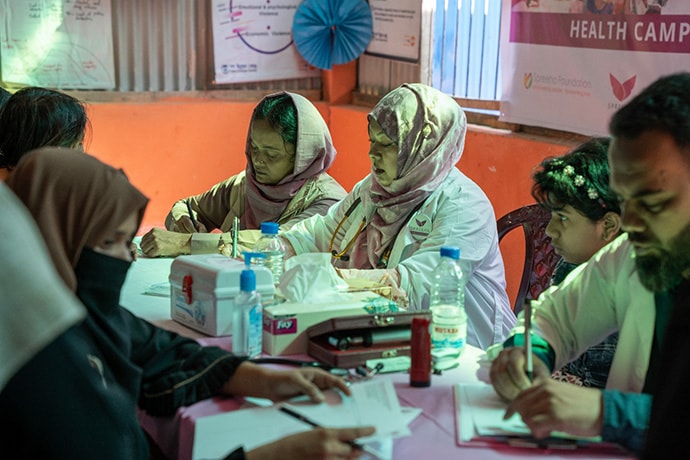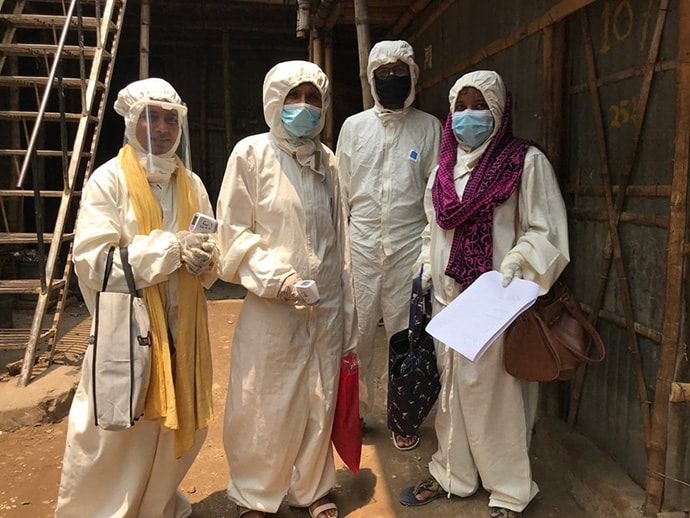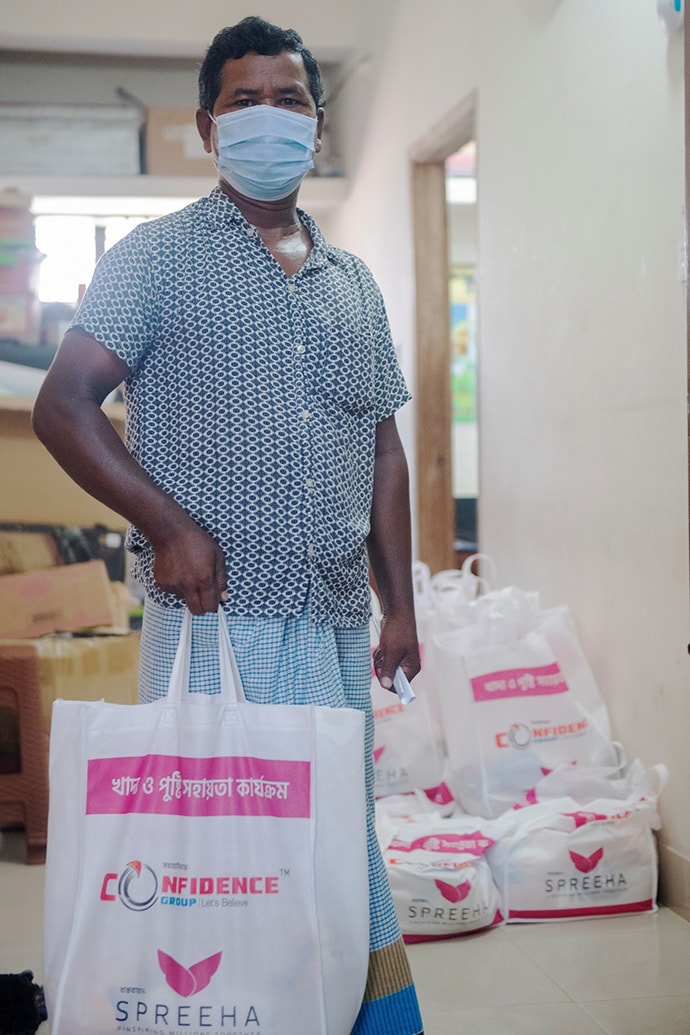By: Halima-Tus-Sadia, Head of Growth and Charu Sikder, Communications Officer at Spreeha Foundation

Telemedicine in remote areas during COVID-19. Photo: Spreeha Foundation
“During those uncertain times; when all doctor chambers were closed, the doctor was there to prescribe me medicines over the telephone which was a great relief for both me and my family” – said Anwar Hossain, while talking about Spreeha’s telehealth service that has been initiated more pro-actively in the wake of Coronavirus in 2020-21.
Understanding Challenges: Bangladesh Disaster Landscape
Bangladesh, situated in South Asia, confronts a multitude of challenges regarding disasters. Natural calamities impact approximately 6% of its population annually, with the country serving as a hotspot for tropical cyclones that wreak havoc in coastal regions, causing significant loss of life and property. Floods, droughts, salinity issues, extreme cold and heat waves, riverbank erosion, and powerful thunderstorms are recurrent occurrences, with Bangladesh enduring over 200 climate-related disasters in the last three decades alone. These calamities have resulted in millions of fatalities and inflicted approximately $16 billion in damage.
Compounding these challenges is the issue of pollution and environmental degradation, particularly evident in the capital city of Dhaka, home to over 22 million residents. Dhaka’s pollution levels rank among the world’s worst, contributing to health issues such as respiratory ailments, skin conditions, and cholera outbreaks. Public health hazards are pervasive throughout the country, exacerbated by events like the COVID-19 pandemic, recurring outbreaks of dengue fever following floods, etc.
Further complicating matters is the presence of the world’s largest refugee camp, located in Cox’s Bazar and Teknaf. Primarily inhabited by Rohingya refugees fleeing persecution in Myanmar, the camp requires substantial resources and robust measures to address disease control and disaster management effectively. The management of this vast refugee population adds another layer of complexity to Bangladesh’s disaster response efforts, necessitating comprehensive strategies to ensure the well-being and safety of all inhabitants.
Spreeha’s response: A ray of hope in the time of crisis
Aalo, meaning ‘light’ in English, is Spreeha’s emergency disaster response program designed to rebuild the lives of individuals and communities impacted by disasters across Bangladesh. From addressing refugee crises to combating global health threats and attending to community-based disaster preparedness needs, Aalo program embraces a comprehensive approach aimed at enhancing community resilience. As of December 2023, we have impacted more than 300,000 lives in Bangladesh affected by disasters.
First responder to Rohingya refugees:
Initially crafted in 2017, this program was specifically tailored to support the Rohingya Refugee Camp in Bangladesh. Understanding the severe conditions prevailing within the camps, our early initiatives focused on distributing solar lights and conducting emergency health camps. These actions were pivotal as the camps lacked access to electricity, and many inhabitants, particularly women, had survived instances of rape and violence.

Health camp for Rohingya refugees. Photo: Isabella Tjalve
Over time, we expanded our services within the camps, establishing a regular health clinic and preschools. These initiatives aimed to provide essential healthcare services and foster a conducive learning environment amidst distressing circumstances, with the assistance of implementing partners. Between 2017 and 2022, we extended support to 69,521 Rohingya refugees through healthcare provisions, preschool education, and the distribution of relief materials.
Keeping quality healthcare at the center of all disaster responses:
During the COVID-19 outbreak, Spreeha recognized the pivotal role of healthcare in disaster relief and preparedness, particularly in safeguarding communities during and after catastrophic events. With the onset of public health emergencies like COVID-19 and frequent Dengue outbreaks, access to quality healthcare became a lifeline for affected populations, addressing preparedness, precautions, illnesses, and urgent medical needs.

Spreeha frontliners during COVID-19 response at field. Photo: Spreeha Foundation
Amidst the lockdowns and restricted access to healthcare facilities, particularly in hard-to-reach areas, we identified the pressing need to bridge the gap in healthcare services. Leveraging the expertise of trained community health workers and compassionate physicians, we initiated telehealth services in three remote districts of the country. This initiative ensured that individuals in remote areas could access essential healthcare services without risking exposure to the virus through long commutes to visit a doctor. More than 5,000 patients were served under this project during the nationwide lockdown.
Recognizing the importance of protecting healthcare providers, we distributed Personal Protective Equipment (PPE), hygiene materials, and hospital-grade respiratory devices to doctors and patients in 13 hospitals across the country. This proactive measure ensured the safeguard of more than 80,000 frontline workers and patients and ensured the continuity of healthcare services amidst the crisis.
Every year, Bangladesh experiences recurring outbreaks of Dengue, overwhelming hospitals with patient admissions during peak seasons. Spreeha conducts community screenings to detect illnesses early, issues timely warnings, and educates people on adopting healthier lifestyles, appropriate preventive measures, and available treatments.
Relief support for disaster affected population:
In response to the unprecedented challenges posed by the COVID-19 pandemic and the devastating impact of Cyclone Amphan, Spreeha has been dedicated to supporting communities in need. We have worked tirelessly to address the far-reaching effects of the pandemic, including job loss and food insecurity, by providing monthly food assistance to over 50,000 individuals and extending cash grants to more than 4,000 people facing distress.
Our commitment to rebuilding schools in Satkhira, destroyed by Cyclone Amphan, reflects our long-term vision for community development and resilience-building. Through these efforts, we have aimed to bridge immediate gaps and sow the seeds for sustainable recovery and empowerment. Our journey underscores the transformative impact of collective action in rebuilding communities and fostering hope amidst adversity. Together, we continue to stride forward, guided by the spirit of solidarity and the belief in the resilience of communities.
The path forward: Building stronger communities
At the heart of our journey lies partnership—a commitment to working hand in hand with communities to navigate challenges and seize opportunities. Through rapid action, we respond swiftly to emerging needs, ensuring that support reaches those who need it most when it matters most. As a proud member of Give2Asia DisasterLink, we collaborate closely with Give2Asia, Confidence Group, United Commercial Bank, University of Washington, Extend the Day, and other esteemed partners to amplify our impact and reach more than 300,000 individuals affected by natural disasters, public health hazards, and refugee influx.

Food pack distribution among ultra poor households during COVID-19. Photo: Spreeha Foundation
Yet, our focus extends beyond immediate relief to foster long-term impact, empowering communities to thrive in the face of adversity. Central to this resilience is community preparedness, equipping individuals and groups with the tools and knowledge they need to weather storms and emerge stronger. Finally, we recognize the power of lifestyle shifts catalyzed by awareness and action, as we strive to create a culture of proactive engagement and sustainable practices. Together, these pillars guide our efforts as we forge ahead, building stronger, more resilient communities for generations to come.
Check out Spreeha’s Telehealth project as emergency disaster response:
*******
Spreeha Foundation has been a member of GlobalWA since 2013. Spreeha strives to break the cycle of poverty for underprivileged people by providing healthcare, education, and skills training. Spreeha envisions life without poverty where underprivileged people are empowered to improve their quality of life. spreeha.org